Oh no, not another sparrow story! Do not worry: Worthen’s Sparrow is a bunting – although New World Sparrow is apparently “en vogue” too. Whatever you want to call it, it’s definitely not a sparrow…
Worthen’s Sparrow is extremely rare. The American Bird Conservancy (ABC) puts the population at a mere 250 to 999. Less than one thousand in “normal people speak”. To make matters worse, this tiny population is declining. The ABC’s website shows a distribution map with a cluster of five dots and a single dot, in the north of Mexico. A dotted distribution map is bad news. “Go and see it before it is too late” would have been a befitting title for this post and sage counsel. Following advice, we left Monterrey on a September morning before dawn and headed for the five-dot cluster.
“We” included my Colorado birding buddies Laura and Brad, local birdo Mauricio and our Kingfisher Birding guide Marilyn. Brad wielded the photographic equipment and Kingfisher provided some additional pictures so fortunately: a post with decent pictures.
The five-dot cluster is south of Monterrey in a desert-like environment and I strongly suggest you listen to appropriate music while reading the rest of the story. Something like this. It really gets you in the right mood. The landscape is astounding. Early in the day the temperature was still low, but both our spirits and the temperature would be lifted to extreme highs during the day.
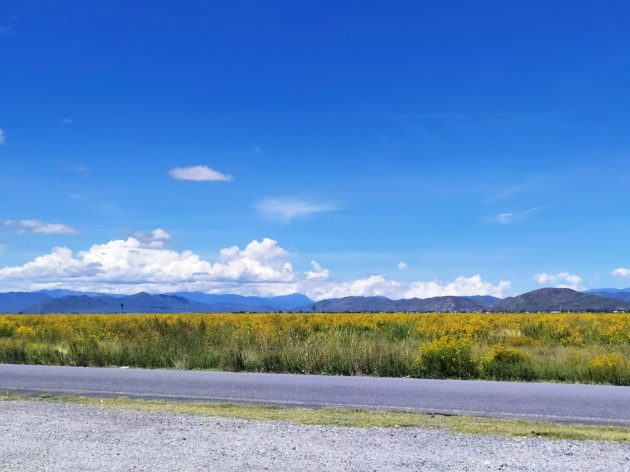
As you can see, we were roadside birding. There was a lot of terrain to cover but we did get out at various points along the route. Not without danger as the cars were driving past at insane speeds – providing the Crested Caracara with regular sustenance.
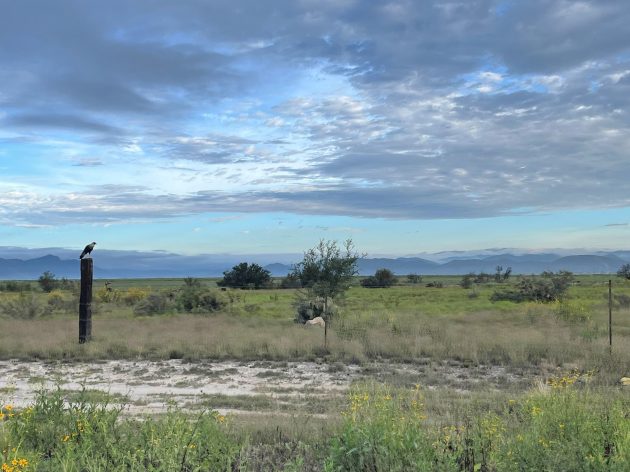
The recent rains had turned the landscape from brown to a pleasant green and yellow. The landscape is treeless but for the Yuccas and some higher growing prickly pear. The appropriately named Mother-in-law’s Chair grows abundantly in the drier areas. Even without any botanical skills we easily counted dozens of plant species per square meter. Of course, the area has been deemed useless and lacks any formal protection.
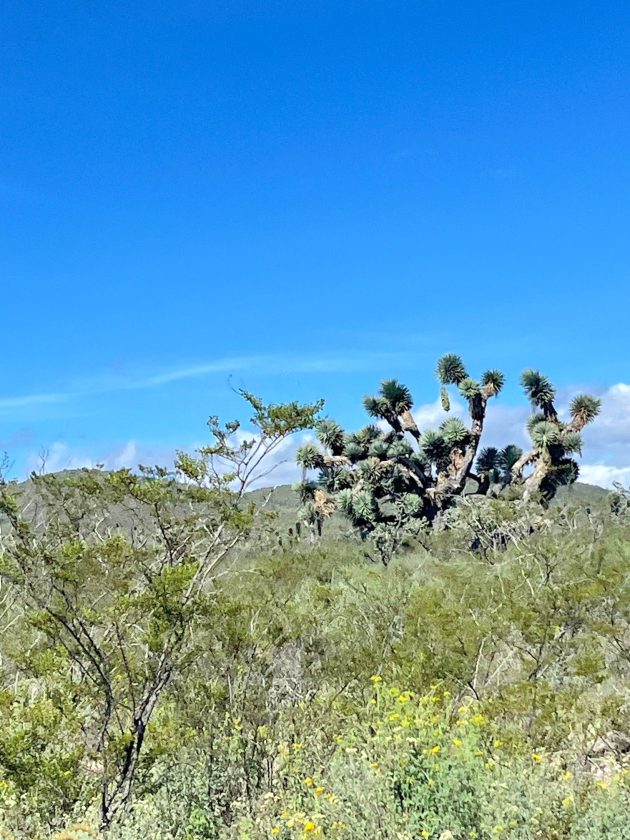
After a 90-minute drive in the dark we stopped at first light, stretched the legs and got ready for the quest. My first lifer made an appearance, Cassin’s Kingbird, and it took me a while to get “on it“. Needless to say we saw several million kingbirds throughout the day so we could have just moved on. Together with the Curve-billed Thrasher the kingbirds were the commonest birds of the day. Worthen’s Sparrow proved to be something else… Our guide’s desperation grew as we were clearly moving from plan A to plan B to plan C. Fortunately, a loud cry from the back of the car “Beaks, beaks, beaks!” alerted us to the presence of Long-billed Curlews – a welcome distraction. A field full of them, about 25 probing for food amongst the mounds of the Mexican Prairie Dogs. A few hundred meters further we stopped for Curve-billed Thrashers and Northern Mockingbird in some bushes, but what would have been a false alert became interesting when a larger bird on the ground, raised its white-tipped crest and decidedly walked away: Scaled Quail. Since 50% of the women in our party are crazy for chicken-like birds one can only imagine the excitement.
Windows open and onwards we drove. Passing a field with lots of Mexican Prairie Dogs I caught a flicker of a tail from the corner of my eye. By this time, we had stopped too many times based on a false alarm, but risking severe disrespect (another thrasher, Peter, really?) I called for a closer look. Lo and behold, that most magnificent of Looney Tunestm creatures was walking in the field: Greater Roadrunner. We just didn’t see it well… At least not until one of us started calling “meep meep” and the bird actually walked into view. Reality being stranger than fiction once more…
A stop at a small dam and reservoir yielded some interesting birds, Pyrrhuloxia, Cactus Wren, Black Phoebe, Eastern Phoebe, Say’s Phoebe and Hooded Oriole. The latter being a lifer for most of us. Nearby we finally spotted some sparrow-like birds on a wire but a positive identification eluded us. Only Brad got some of the field marks.
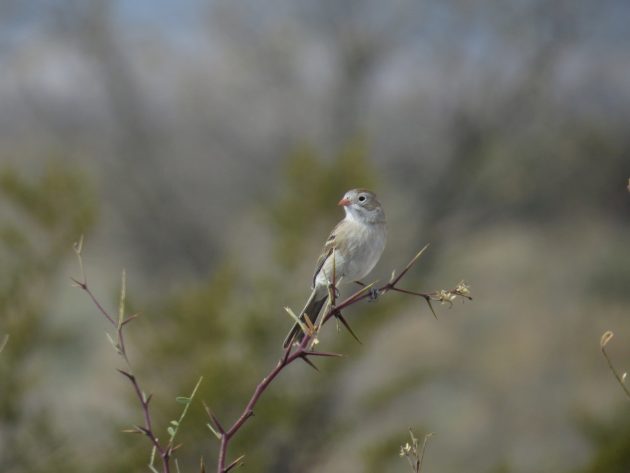
Less than 15 minutes later the situation would repeat itself, now with our guide and your author seeing not much more than a glimpse of Worthen’s Sparrow. When there are only a thousand specimens left and recent rains have made the whole wide landscape good biotope, well, that’s a clear case of too much habitat. Considering the main threat to these plucky little birds, that’s good news for the birds but sour grapes for birders.
We finally arrived at the Valle de Soledad – the Valley of Loneliness – an appropriate name for a truly desolate place. Upon closer inspection this vast field revealed itself as a dog town. The little rodents had manicured an area as far as the eye could see.
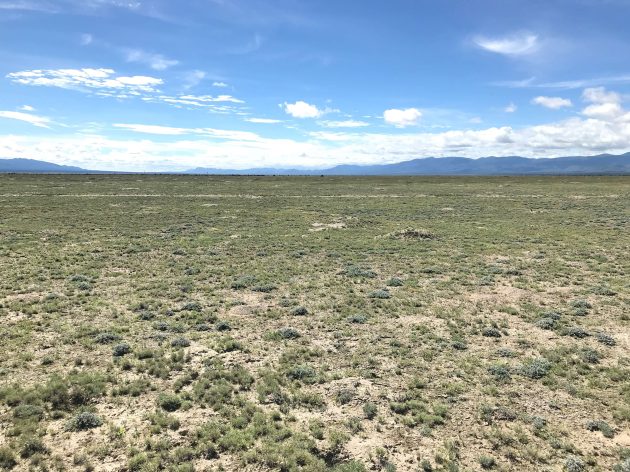
We found Black-tailed Gnatcatcher and Blue-grey Gnatcatcher in the shrubs along the road which allowed us to compare the angrier song of the Black-tailed Gnatcatcher with the mellower song of its congener. It’s 1979 and you’re comparing The Clash with The Doobie Brothers – along those lines.
We gave up on the sparrows and changed biotope. A quick visit to Camino al Diamante was surprisingly fruitful. Lifers instead of “girl’s best friends“: Phainopepla, Black-headed Grosbeak and Clay-coloured Sparrow. A thunderstorm rolled in and we called it quits.
Driving back to Monterrey we made good time – the heat had driven most birds into hiding – so we had time for some city birding in the Monterrey parks. We birded Calzada San Pedro (Plaza Fátima) and Monte Palatino. Golden-fronted Woodpecker, Black-crested Titmouse and Green Parakeet were our rewards before a well-deserved dinner. A few days later I also saw Red-crowned Parrot in a large flock over the city. These birds are more common in cities than they are in the wild these days but they were wild birds and countable as lifers. Two lifer parrots, half a sparrow, a quail, curlews, a Looney Tune and spades of good memories in one trip: better than…?
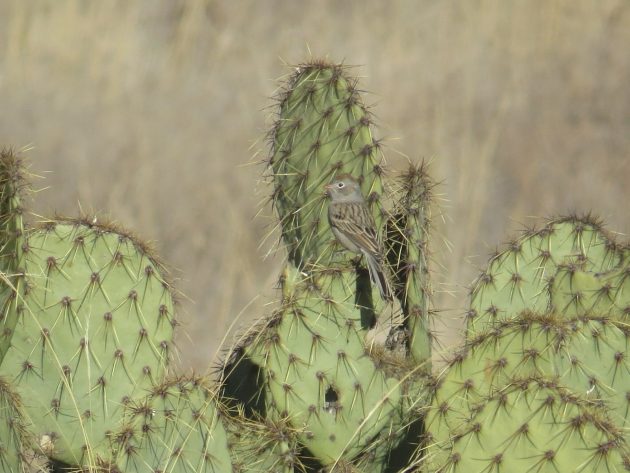
Source link
Facebook
Pinterest
Twitter
LinkedIn

